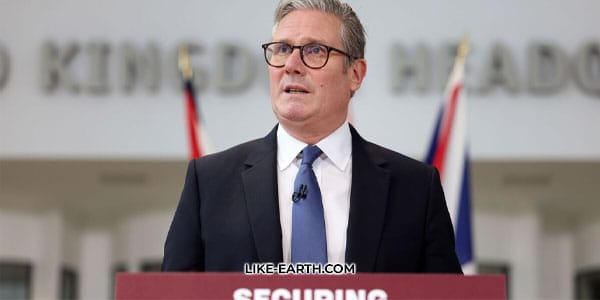Starmer’s Chagos Sleight of Hand The Maths Behind

The maths behind Starmer’s Chagos sleight of hand reveals a political equation that combines diplomacy, legacy concerns, and legal pressures. This controversial calculation has sparked widespread debate among international law experts and human rights advocates.
As Labour leader Sir Keir Starmer positions himself on key foreign policy matters, his nuanced stance on the sovereignty of the Chagos Islands is drawing attention. Behind the surface lies a complex balancing act of strategic interests, public sentiment, and international obligations.
Understanding the Chagos Dispute: A Brief Overview
The Chagos Islands, located in the Indian Ocean, have long been a point of contention between the UK and Mauritius. In 1965, Britain detached the Chagos Archipelago from Mauritius prior to granting the latter independence, creating the British Indian Ocean Territory (BIOT).
Decades later, the decision remains a sore point. The islanders were forcibly removed to make way for a US military base on Diego Garcia. Despite repeated calls for justice, they remain displaced. International court rulings, including a 2019 ICJ advisory opinion, declared the UK’s administration of Chagos as unlawful.
Labour’s Foreign Policy Dilemma
As elections loom, Starmer’s party seeks to portray itself as modern and legally principled. Yet, restoring the Chagos Islands to Mauritius outright could complicate military partnerships, particularly with the US. This is where Starmer’s sleight of hand comes into play.
Rather than full transfer, Labour is reportedly considering a shared-sovereignty model. Under this model, UK and Mauritian governance would co-exist, keeping Diego Garcia secure while acknowledging Mauritian claims.
The Calculations Behind the Strategy
Starmer’s approach factors in several key variables:
- Legal Pressure: The UN General Assembly and ICJ have deemed British occupation unlawful.
- Geopolitical Stakes: Diego Garcia is a crucial Western military outpost, especially amid tensions in the Indo-Pacific.
- Public Image: Labour must show respect for international law without appearing weak on defense.
- Electoral Optics: A moral but pragmatic stance could win centrist and progressive voters alike.
The sleight lies in Labour’s ability to present a compromise that appeases global critics while maintaining key strategic interests. It’s a mathematical balance of diplomacy and practicality.
Opposition and Backlash
Not everyone is convinced. Critics say shared sovereignty dilutes accountability and prolongs injustice. Human rights advocates argue that only full restitution of the islands and resettlement rights for Chagossians will deliver true justice.
Former Labour MPs have also voiced concern. “This isn’t a solution, it’s a delay tactic dressed in legalese,” one party insider said anonymously.
Others point to the costs involved. Rebuilding infrastructure for returning Chagossians could run into hundreds of millions of pounds. Starmer’s team must weigh moral obligations against fiscal realities.
International Law and Political Precedents
Labour’s proposal must also navigate legal precedents. The ICJ’s ruling isn’t binding, but it carries weight. So does the support of African Union nations and other global powers pushing Britain to comply.
Ignoring this consensus could harm the UK’s global standing. But embracing it fully could jeopardize military cooperation. Starmer’s method aims to avoid both extremes.
Domestic Sentiment and the Media Narrative
British public awareness of the Chagos issue remains limited. Starmer’s move, couched in terms of diplomacy and compromise, may be designed to fly under the radar of mass media attention.
However, should the issue gain traction—especially in the lead-up to a general election—it could become a test case for Labour’s values and leadership.
Where Things Stand Today
As of May 23, 2025, Starmer has yet to publish a formal policy paper. However, behind-the-scenes talks between British and Mauritian officials continue. Analysts expect announcements in the coming months as Labour firms up its foreign policy stance.
For now, the UK maintains de facto control of the Chagos Archipelago. Mauritius continues its legal and diplomatic efforts to reclaim the territory, with global backing growing.
The future of the islands may hinge on whether Starmer’s careful calculus can satisfy both sides—or whether it falls apart under scrutiny.
The Broader Implications for British Policy
Labour’s handling of the Chagos issue could set a precedent for other colonial legacy matters, including debates over Gibraltar, the Falklands, and Northern Ireland.
If Starmer successfully executes his “sleight of hand,” he may redefine Britain’s approach to post-colonial restitution. If not, he risks accusations of double-dealing and failure to uphold international law.
Public Engagement and Resources
To learn more about the Chagos Islands and ongoing policy debates, readers can visit Like Earth’s geopolitical archives.
For real-time updates and breaking political news, join our verified WhatsApp channel: Stay Informed with WhatsApp Alerts. Starmer’s Chagos Sleight of Hand
Share This Article
Let your friends know about this exciting news!



